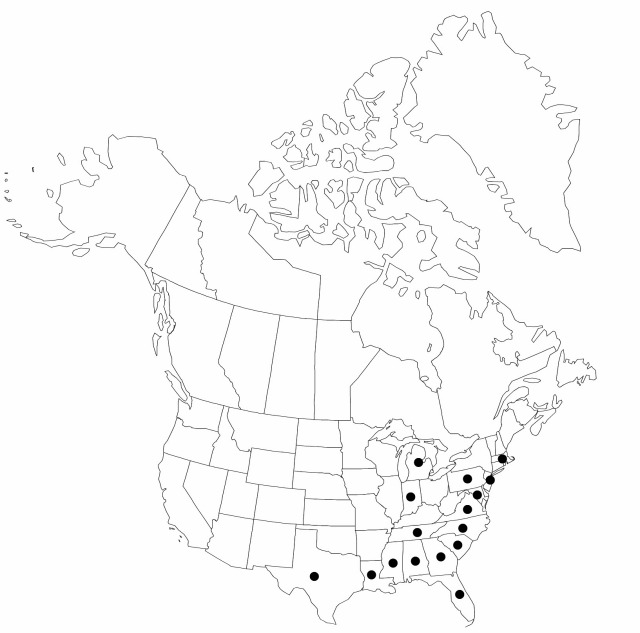Difference between revisions of "Eleocharis microcarpa"
Ann. Lyceum Nat. Hist. New York 3: 312. 1836.
FNA>Volume Importer |
RevisionBot (talk | contribs) m (Bot: Adding category Revised Since Print) |
||
| (3 intermediate revisions by 2 users not shown) | |||
| Line 6: | Line 6: | ||
|place=3: 312. 1836 | |place=3: 312. 1836 | ||
|year=1836 | |year=1836 | ||
| + | }} | ||
| + | |special_status={{Treatment/ID/Special_status | ||
| + | |code=F | ||
| + | |label=Illustrated | ||
}} | }} | ||
|basionyms= | |basionyms= | ||
| Line 19: | Line 23: | ||
-->{{Treatment/Body | -->{{Treatment/Body | ||
| − | |distribution= | + | |distribution=Ala.;Fla.;Ga.;Ind.;La.;Mass.;Md.;Mich.;Miss.;N.C.;N.J.;Pa.;S.C.;Tenn.;Tex.;Va.;West Indies. |
|discussion=<p>Varieties 2 (2 in the flora).</p><!-- | |discussion=<p>Varieties 2 (2 in the flora).</p><!-- | ||
--><p>Specimens of <i>Eleocharis brittonii</i> and <i>E. microcarpa</i> without achenes are often difficult to distinguish. More detailed study of the four apparent entities across the two species is warranted.</p> | --><p>Specimens of <i>Eleocharis brittonii</i> and <i>E. microcarpa</i> without achenes are often difficult to distinguish. More detailed study of the four apparent entities across the two species is warranted.</p> | ||
| Line 50: | Line 54: | ||
|basionyms= | |basionyms= | ||
|family=Cyperaceae | |family=Cyperaceae | ||
| − | |distribution= | + | |distribution=Ala.;Fla.;Ga.;Ind.;La.;Mass.;Md.;Mich.;Miss.;N.C.;N.J.;Pa.;S.C.;Tenn.;Tex.;Va.;West Indies. |
|reference=None | |reference=None | ||
|publication title=Ann. Lyceum Nat. Hist. New York | |publication title=Ann. Lyceum Nat. Hist. New York | ||
|publication year=1836 | |publication year=1836 | ||
| − | |special status= | + | |special status=Illustrated |
| − | |source xml=https:// | + | |source xml=https://bitbucket.org/aafc-mbb/fna-data-curation/src/2e0870ddd59836b60bcf96646a41e87ea5a5943a/coarse_grained_fna_xml/V23/V23_134.xml |
|genus=Eleocharis | |genus=Eleocharis | ||
|subgenus=Eleocharis subg. Eleocharis | |subgenus=Eleocharis subg. Eleocharis | ||
| Line 63: | Line 67: | ||
}}<!-- | }}<!-- | ||
| − | -->[[Category:Treatment]][[Category:Eleocharis (sect. Eleocharis) ser. Tenuissimae]] | + | --> |
| + | |||
| + | [[Category:Treatment]] | ||
| + | [[Category:Eleocharis (sect. Eleocharis) ser. Tenuissimae]] | ||
| + | [[Category:Revised Since Print]] | ||
Latest revision as of 18:36, 6 November 2020
Plants usually annual, tufted, sometimes mat-forming via proliferating and arching inflorescences (stoloniferous), sometimes entirely vegetative; rhizomes absent. Culms often ascending or arching, quadrangular or broadly elliptic, 2–40 cm × 0.1–0.4(–0.6) mm, soft. Leaves: distal leaf sheaths persistent or disintegrating, pale brown, green or red-brown, streaked or mottled red-brown or purple, translucent, membranous, apex narrowly acute. Spikelets: basal spikelets absent; often proliferous, ovoid to ellipsoid or lanceoloid, terete, 2–10.7 × 1–2 mm, apex acute; proximal scale empty, persistent, amplexicaulous, dissimilar to floral scales, often longer, often resembling an involucral bract, ovate to lanceolate, midrib markedly thickened and broad and often prolonged beyond lamina; subproximal scale with flower; floral scales spiraled, colorless, whitish, or pale brown, streaked or mottled red-brown or purple, midribs green and red-brown or green and purple, ovate to elliptic, 0.8–1.5 × 0.4–0.8 mm, membranous, midrib obscure to prominent. Flowers: perianth bristles present or sometimes apparently absent; stamens 3; anthers 0.15–0.35; styles 3-fid. Achenes whitish to olive or pale brown, sometimes spotted olive or red-brown, obovoid, trigonous (or subterete), angles prominent, 0.55–0.8 × 0.3–0.5 mm, apex constricted proximal to tubercle, smooth. Tubercles green or pale brown to red-brown, trigonous.
Distribution

Ala., Fla., Ga., Ind., La., Mass., Md., Mich., Miss., N.C., N.J., Pa., S.C., Tenn., Tex., Va., West Indies.
Discussion
Varieties 2 (2 in the flora).
Specimens of Eleocharis brittonii and E. microcarpa without achenes are often difficult to distinguish. More detailed study of the four apparent entities across the two species is warranted.
Selected References
None.
Key
| 1 | Perianth bristles 0.2–0.4 mm, shorter than achene; proximal scale of spikelets 0.4–0.5 mm wide. | Eleocharis microcarpa var. microcarpa |
| 1 | Perianth bristles 0.6–1 mm, shorter than to equaling achene; proximal scale of spikelets 0.8–1 mm wide. | Eleocharis microcarpa var. filiculmis |